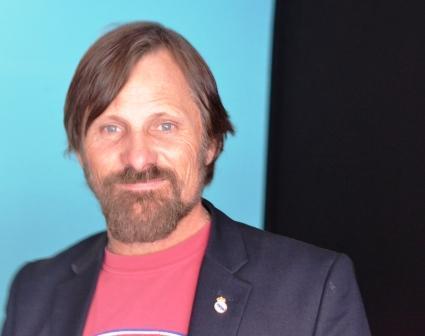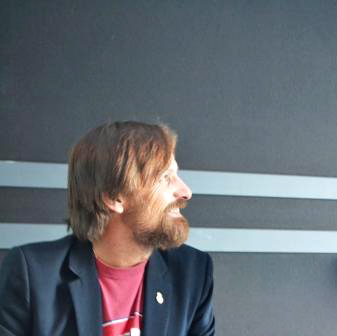I met with Viggo Mortensen here in Cannes, to discuss his role as the star of Lisandro Alonso's film Jauja, which premiered here this week. Wasn't it difficult for Viggo to take a role in such an elliptical film? An experimental movie, it is never entirely clear what Jauja is about -- and as the director told me, he likes it this way. All we know is that a Danish captain shows up in Patagonia in the 1882 with his fifteen-year-old daughter, to help an army fight against the indigenous people, and then the daughter disappears, leaving him to wander in the desert. He searches endlessly for her: rather like the two "Jerry" characters in Gus Van Sant's eponymous flick, who also wander lost in the desert.
How did Viggo manage to enter into his character in such an enigmatic script? He seems to exist only as a metaphor for the human condition: the continual search for something we can never find. I imagined it would be impossible to even come up with a back story.
"It was not difficult at all," Viggo said, leaning forward and staring at me with serious eyes. "I was not vague about who I was, despite the existential script. I play a Danish captain, in 1882. I play a northern European, a surveyor and scientist who is very rational in his thinking, always finding a logical reason. For example, in the first scene, when he first arrives to this new country with his daughter, he is trying to understand what the military man he meets is talking about; first thing, he asks and then gives his opinions about this mysterious information. Same with the mysterious old woman he later meets in the desert. The presence of that old woman does not make sense. He asks himself: 'What is this?' He is old fashioned; he is a guy from the country. When he does not understand, he asks. My character is in the same position of the audience -- trying to figure out what is happening."
"It's rather like Don Quixote," he continued, in as easy and clear a manner as his director had been abstract and vague. "Don Quixote is both serious and specific."
Viggo had very definite ideas about his craft: They came to the fore in this film.
"If you want something existential and universal too, you need to be specific and detailed; you need to give it weight. The more specific you are, as an actor, the more you can make a leap The Danes were involved in two wars in the 1800s: in 1848 and 1864. For my role, I found a uniform from this 1848 war, as well as a saber from this war, and a double-medal for a man who served in both wars. This medal was very important. Most of the people back then were farmers, but they would be out with the pigs, with their medals, that is how important these medals were."
But did he see his character evolve in this film? The one refrain repeated in the film is: "What makes a life function and move forward?" Where does this wandering Captain get to at the end?
"Yes, he does evolve," Viggo's eyes lit up. "And his evolution lies in the very fact that by the end of the film, he is asking that question: 'What makes a life function and move forward.' And he says: 'I don't know' and smiles. He accepts that he cannot control it."
But what has gone on in that hallucinatory journey in the desert? Is the old woman he meets his daughter stuck in time or an arbitrary woman or... ?
"She could be a dream, or the daughter, or the dream of a dog. It doesn't matter."
It did not seem to matter for the audience at Cannes as well. They had clapped enthusiastically at the end of this inchoate film, which ends with a scene that begs to be deciphered (suddenly we are in a house!), as if they had not only accepted but adored the existential adventure for what it is: a sublime experience of our existential wandering through time.It was a surprising reaction, since some of Alonso's previous films have been disparaged as "pretentious."
"This film is not pretentious," Viggo asserted, speaking even more passionately about the film than the director, whom I had spoken to just a moment before. "Each step follows the next. Lisandro's thought is every bit as innovative as Tarkovsky's, in terms of visual poetry, and in this case, spoken poetry."
Viggo's involvement in the film was not just as an actor. He had even collaborated with the Lisandro, helping him choose music for it. "Lisandro told me he wanted to have a break between scenes, and I said you should listen to Buckethead, very strange music, to shift the tempo. I happen to know Buckethead personally, as I had done some work with him." He had also discussed the film at length with the Argentinean director, in Spanish, of course. Viggo had spent his childhood in Argentina.
It was the first time I had interviewed an actor who seemed so heartily on the same wavelength as his director.
"Oh but I have had the same kind of collaborative approach with other directors," said Viggo, calmly. "For example, Cronenberg.I always try to work with the director. I can do a better job if we understand each other."
Viggo has made two films with Cronenberg. How did it feel for him to play now in a low-budget film?
"The budget of this movie?" he said. "It doesn't matter what the budget of a film is, or if there is a crew of ten or twelve: the relationship with the camera is still the same. In fact, the more expensive a film is, the less likely that it is going to be different from another movie. If it's an expensive movie, the investor wants some guarantee for a return: either well-known actors, a director who is known to make money or a story that has made money before. The chances are slim that you are going to make something original, a film in which you break with conventions of time and space, and shot selection. You will get nothing like what Lisandro is doing."
Although, he admitted, some expensive movies -- "like Avatar and Lord of the Rings -- are really interesting."
Did he have some criteria for choosing the next film he would act in?
"Yes, I do have criteria. All I am looking for is a movie that I would be able to see in twenty years and be proud of."


